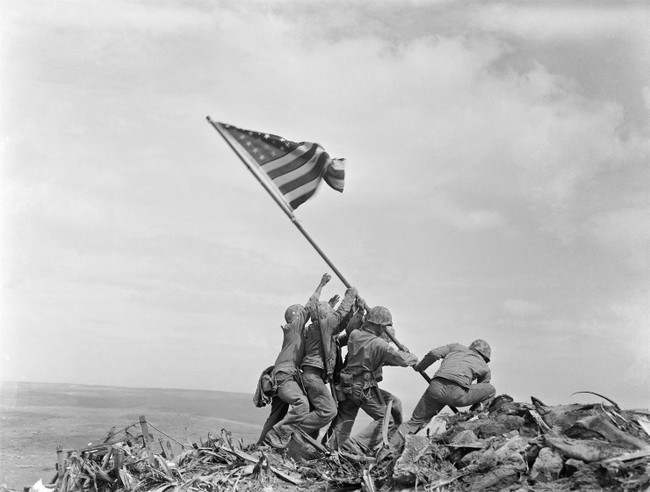Iwo Jima and WWII Marine Heroes

Eighty years ago today, on Feb. 23, 1945, a half dozen Marines declared U.S. control of Mount Suribachi on Iwo Jima by raising the American flag, a moment captured in one of the most iconic photographs in American history. Many were the outstanding heroes of Iwo Jima, for, as Adm. Chester Nimitz said of the U.S. Marines fighting there, “uncommon valor was a common virtue.”
Advertisement
The photo — which actually depicts that day’s second flag raising by the Marines — seemed to capture in one image the struggle and yet the victory, the perseverance, the patriotism, and the courage of the Marines during World War II. Three of the men in that photo would die in combat, and all of them sacrificed greatly to win freedom for America and the world. On Iwo Jima, the Japanese fully illustrated their dedication to their warped philosophy that ended up necessitating the dropping of the atom bombs; namely, that they would fight to the last man (and woman and child) for every inch of Japanese soil. But even so, they could not defeat the mighty U.S. Marine Corps.
The six Marines in the famed image were Michael Strank, Harlon Block, Franklin Sousley, Ira Hayes, Harold Schultz and Harold Keller, according to the Smithsonian. The first three subsequently died in battle. AP photographer Joe Rosenthal took the photo. If you go to the National Museum of the Marine Corps in Virginia — which I highly recommend — you can see the flag that was raised on Mount Suribachi. It is tattered and worn, but it has survived all these long years, a visible symbol of American daring and triumph.
The original flag raised on Iwo Jima on this day in 1945 pic.twitter.com/KTqC0dX1tK
— Catherine Salgado (@CatSalgado32) February 23, 2025
Today I would also like to share the stories of two of the 22 Marines who received Medals of Honor for actions on Iwo Jima, as well as a brief tribute to Medal of Honor recipient John Basilone, who died there. In fact, 25% of WWII Medals of Honor to Marines were awarded for actions during the Battle of Iwo Jima, according to the USMC Museum.
Advertisement
Just a few days after his 17th birthday, Private First Class Jacklyn H. Lucas was creeping through a twisted ravine on Iwo Jima with three other men from his rifle team when they were ambushed by the Japanese. As the men jumped in foxholes, two grenades landed near Lucas. Without hesitation, Lucas threw himself on top of both grenades. One of the grenades exploded wounding Lucas' right arm and wrist, right leg and thigh, and chest. For his actions, Lucas was awarded the Medal of Honor, making him the youngest Marine and service member to receive the medal in World War II.
Lucas had accomplished more by age 17 than some people do in their lifetimes.
The Marine Corps museum tells also of Cpl. Woody Williams, who lived to be reportedly the last living Medal of Honor recipient from WWII as of 2022.
Corporal Hershel “Woody” Williams received the Medal of Honor for his actions on 23 February 1945. On this day, Cpl Williams volunteered his services to assist in reducing enemy pillboxes, mines, and other defensive positions. Being covered by only four riflemen, he fought for four hours under heavy enemy fire and repeatedly returned to his lines to prepare demolition charges and obtain a flamethrower. On one occasion, Cpl Williams mounted a pillbox and inserted the nozzle of the flamethrower into the air vent, killing the enemy inside. He then charged an enemy rifleman who attempted to stop him but he met the might of Cpl Williams’ flame thrower.
Advertisement
Read Also: James Baskett: History-Making Actor and ‘Uncle Remus’
Finally, we remember John Basilone, who had already received a Medal of Honor when he returned to combat on Iwo Jima and gave his life:
One of the most recognizable Medal of Honor recipients of WWII is Gunnery Sergeant John Basilone. Basilone was awarded the Medal of Honor for his actions during the Battle of Guadalcanal on 24 and 25 October 1942. After a stateside tour to aid the war bond effort, Basilone voluntarily returned to battle and landed on Iwo Jima on 19 February, 1945, D-Day. After single-handedly destroying a Japanese blockhouse, Basilone was killed by enemy mortar shrapnel. For his actions, Basilone was posthumously awarded the Navy Cross, the second highest decoration awarded for valor in combat.
Among the Marines who brought genocidal imperial Japan to its knees, uncommon valor truly was a common virtue.